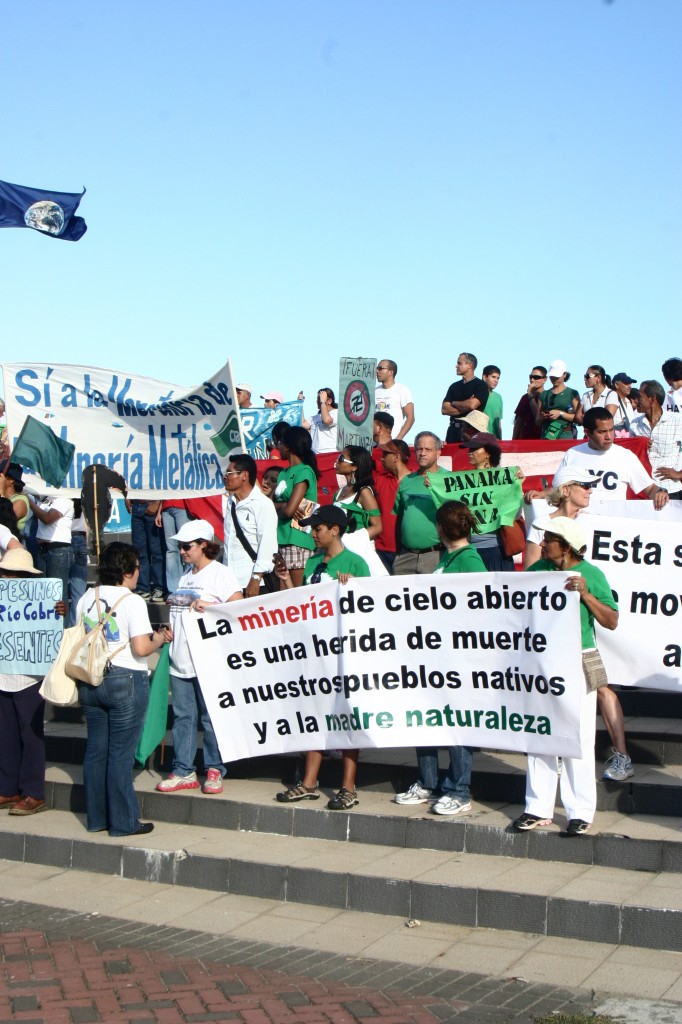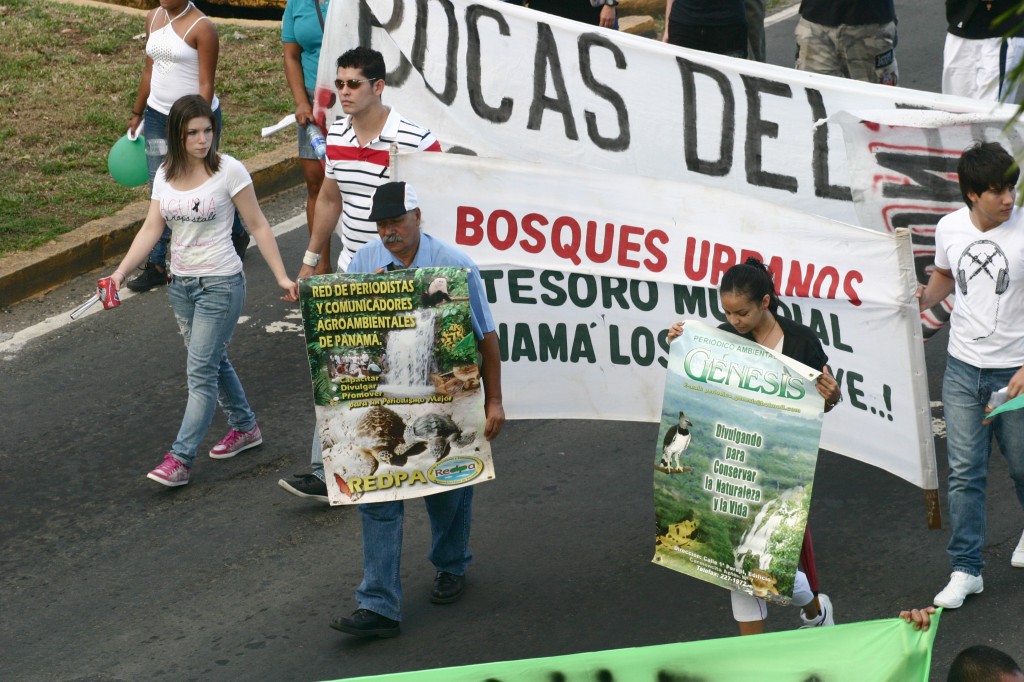January and February of 2011 have been turbulent months for Panama. The latest cause of discontent and division among Panamanians is a law approved by the National Assembly and signed by President Ricardo Martinelli that reforms the mining code. As reported by the Panamanian Government's website [es]:
El presidente de la República, Ricardo Martinelli sancionó –este viernes 11 de febrero- el proyecto que reforma el Código de Recursos Minerales, por lo que ahora, la minería tendrá que aportar más dinero a las comunidades, a los municipios y al Estado.

Students, indigenous people, civil rights and environmental groups marched on the Coastal Highway to protest reforms to the mining code. Image under copyright by Demotix taken by Guillermo Johnson
The same site also points out the reforms’ strengths, concluding that they benefit all Panamanians:
Con este nuevo código ganamos todos los panameños al modernizar un código que tenía 50 años de atraso y abre las puertas para la generación de miles de empleos.
However, Panamanians have not been very receptive to these reforms and they talk about the damage it can cause to the environment. Several environmental groups, students and unions rallied in marches and protests. Telemetro [es] reported:
Más de 70 organizaciones ambientalistas panameñas e internacionales le han pedido al gobierno dialogar para cambiar la reforma porque, advierten, la minería a cielo abierto en un país de clima tropical y lluvioso como Panamá tendrá efectos adversos graves.
Furthermore, indigenous groups blocked roads for more than several days until the government committed to dialogue, as reported in La Prensa [es]:
Así, reiteró que hoy, martes 1 de marzo se inicia el diálogo sobre las reformas mineras entre el Gobierno y los indígenas.
Como parte del acuerdo se revisarán qué artículos de la Ley 8 que reformó el citado código tienen incidencia en la comarca Ngäbe Buglé y la posibilidad de crear un articulado o ley que garantice la protección de recursos naturales e hídricos de esas regiones, mencionó la funcionaria en el noticiero matutino.
Thus, [Interior Minister Roxana Méndez] reiterated that on Tuesday March 1st the dialogue on mining reforms between the government and indigenous people will begin.
As part of the agreement they will review which sections of Law 8, which amended the [mining] code, have an impact on the Ngäbe Buglé territory and the possibility of creating an article or law guaranteeing the protection of natural and water resources in those regions, as the official mentioned in the morning news.
Reactions appeared quickly on social networks. Cheryl Martinez (@chery2621) writes to the president through his Twitter account, asking him to not use mining as a means to move the country forward.
@rmartinelli el medio ambiente y la belleza de Panama vale muchos mas… Hay otras manera de hacer crecer el pais no con la mineria :(
Carlos Moral (@cmmoral), on the other hand, represents the group that is in favor of mining and criticizes the double standard that some seem to reveal as they are against mining but in favor of the benefits it brings:
Aca en #panama nos quejamos de las minas y la mineria, pero como consumidores la incentivamos, no queramos torta sin que se rompa el huevo
Meanwhile, the president insists that the protests and discontent are due to a hidden political agenda and to misinformation. The site Terra [es] reports on the president's statements:
“Hay personas que han querido por cuestiones políticas oponerse a esto”, dijo Martinelli al canal 13 de televisión. “También hay personas de afuera empresas que no quieren que haya más cobre en ninguna parte del mundo para ellos seguir manteniendo el monopolio y seguir manteniendo los precios alto”
Avarana replies to the president's stance in his blog Avarana [es]:
Si vemos las noticias y declaraciones de “altos” funcionarios gubernamentales, alguien podría pensar que la lucha en contra de la mineria en Panamá es un asunto entera y exclusivamente de indígenas, extranjeros, y esos ambientalístas locos. Esa es la mentira que nos ha vendido el gobierno, el mismo que dice no entender el porque las protestas: si ya no se van a tocar las comarcas, entonces no hay nada por qué quejarse, ¿verdad? Además, qué saben ellos sobre la Naturaleza; de seguro estan manipulados. ¿Verdad?
Avarana later adds that the only interest in mining is economic, not taking into account other issues:
Los perjuicios de la mineria trascienden los límites comarcales o provinciales, pero el gobierno no puede ver más allá de sus bolsillos, y se complica aún más porque decide azuzar a una de las sociedades que históricamente más ha sufrido la manipulacíón y desinterés de los políticos.

Students, indigenous people, civil rights and environmental groups marched on the Coastal Highway to protest reforms to the mining code. Image under copyright by Demotix taken by Guillermo Johnson
The dialogue began on March 1st with some drawbacks and is expected to continue until Thursday March 3rd, as reported by La Prensa [es]:
Nueve horas después de lo pactado originalmente, quedó instalada anoche en San Félix, Chiriquí, la mesa de diálogo entre la Coordinadora ngäbe buglé y el Gobierno para revisar la Ley 8 que reformó el Código de Recursos Minerales.
Meanwhile, Panamanians hope the conflict is resolved in the best possible way for the whole country.
Update 03/03/11: La Estrella [es] reports that during a meeting with the indigenous ngöbe, President Martinelli announced Law 8 will be repealed.







1 comment